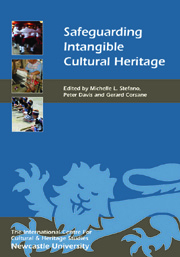Book contents
- Frontmatter
- Contents
- List of Illustrations
- Acknowledgments
- Touching the Intangible: An Introduction
- NEGOTIATING AND VALUING THE INTANGIBLE
- APPLYING THE INTANGIBLE CULTURAL HERITAGE CONCEPT
- 8 Reflections on the Implementation of the UNESCO 2003 Convention for the Safeguarding of Intangible Cultural Heritage in France
- 9 Government and Intangible Heritage in Australia
- 10 Proud to be Dutch? Intangible Heritage and National Identity in the Netherlands
- 11 Intangible Cultural Heritage in Wales
- 12 Conversation Piece: Intangible Cultural Heritage in Botswana
- 13 The UNESCO Convention for the Safeguarding of Intangible Cultural Heritage and its Implications for Sustaining Culture in Nova Scotia
- ON THE GROUND: SAFEGUARDING THE INTANGIBLE
- List of Contributors
- Index
10 - Proud to be Dutch? Intangible Heritage and National Identity in the Netherlands
from APPLYING THE INTANGIBLE CULTURAL HERITAGE CONCEPT
Published online by Cambridge University Press: 05 February 2013
- Frontmatter
- Contents
- List of Illustrations
- Acknowledgments
- Touching the Intangible: An Introduction
- NEGOTIATING AND VALUING THE INTANGIBLE
- APPLYING THE INTANGIBLE CULTURAL HERITAGE CONCEPT
- 8 Reflections on the Implementation of the UNESCO 2003 Convention for the Safeguarding of Intangible Cultural Heritage in France
- 9 Government and Intangible Heritage in Australia
- 10 Proud to be Dutch? Intangible Heritage and National Identity in the Netherlands
- 11 Intangible Cultural Heritage in Wales
- 12 Conversation Piece: Intangible Cultural Heritage in Botswana
- 13 The UNESCO Convention for the Safeguarding of Intangible Cultural Heritage and its Implications for Sustaining Culture in Nova Scotia
- ON THE GROUND: SAFEGUARDING THE INTANGIBLE
- List of Contributors
- Index
Summary
This paper builds on the distinction between three key stakeholders with regard to the preservation of heritage in general and intangible heritage (hereafter ICH) in particular. In particular, these are the source community itself, local and national authorities and heritage professionals. In the Netherlands, the debate surrounding ICH is rather recent. The 2003 UNESCO Convention for the Safeguarding of the Intangible Cultural Heritage has stimulated discussion among professionals, but in a limited sense. In the last few years, however, the topic has been addressed by politicians and, as a consequence, ICH has entered public debate. In some ways, more than tangible heritage, ICH has become the focal point of a national debate on identity. The instrumentalisation – ie the political use – of ICH and the role of the three stakeholders in the Netherlands are discussed using the St Nicholas festivities (an old Dutch tradition) and the celebration of the abolishment of slavery (a new shared tradition) as two examples.
NATIONAL IDENTITY AS POLITICAL ISSUE
Francis Fukuyama argued in The End of History and the Last Man (1992) that the progression of human history was complete. The struggle between ideologies ceased as a result of the fall of the Berlin Wall in 1989 and the end of the Cold War, when political and economic liberalism would triumph. In reality, one ideology replaced the other. Throughout Europe, the last decade of the 20th century ushered in a remarkable revival of interest in national identity that is reminiscent of late 19th-century nationalism.
- Type
- Chapter
- Information
- Safeguarding Intangible Cultural Heritage , pp. 125 - 136Publisher: Boydell & BrewerPrint publication year: 2012



